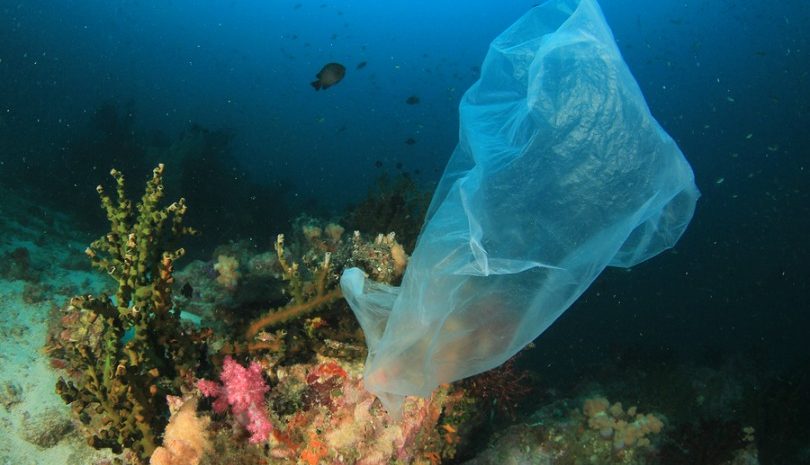Ban The Bag should apply to online retail too

You’ve probably all heard of the Ban The Bag initiative. It’s a movement to ban plastic bags statewide to reduce the shocking amount of plastic we produce. But premiers are skirting around the issue like a plastic bag in the wind.
While some companies like Harris Farm actually seem to be up for the ban and some places – like Coles Bay in Tasmania – have gone ahead and implemented a ban themselves, we need broader action from other retailers and the Government.
The stakes are high: A lot of our plastic waste ends up in oceans and many sea creatures such as turtles confuse it with jellyfish, their natural food. Our oceans are beyond threatened, and we, as retailers and brands, are part of the root cause of this every day.
But with all the focus on plastic bags given out in stores, we have completely forgotten about online orders.
In my experience 9 out of 10 online orders come in plastic bags, some plain, some heavily branded with options to turn it into a returns bag, but all single-use, non-biodegradable and very damaging to the environment.
I’ve run some rough numbers and made a lot of guesstimates about plastic bag use (it’s my old consultancy career creeping in). This is what we’re facing today.
Online retail spend in Australia will be north of $30 billion this year. If we assume that 70 per cent of that figure involves products that are shipped in some sort of wrapper, we’re talking about 200-500 million parcels delivered in plastic bags a year. It’s a lot of single-use plastic!
As retailers we can stop this happening and we should stop this happening. Why are we even still using plastic bags? There are alternatives, including boxes, cornstarch bags, biodegradable bags and more. New materials are being developed all the time.
So why are we waiting for a government ban before we stop using plastic? The arguments I frequently hear have to do with cost, supply and what I feel is a real lack of focus on the fulfillment part of the business.
Make packaging a marketing cost
Let’s start with cost. The eco-friendly options may appear to be more costly, but at Flora & Fauna we managed to save over 15 per cent by removing plastic from our supply chain. Plus, our customer retention increased.
Customers, particularly millennials, are becoming more socially responsible and are looking for companies to work for, and buy from, that hold similar values. There are plenty of reports from Deloitte, McKinsey and more all showing this, so I’d encourage you to look at it as a marketing or customer engagement cost.
At Flora & Fauna all our packaging costs are attributed to marketing, and we have seen it as a far more cost-effective way of retaining customers than digital initiatives.
The lack of supply of plastic alternatives is something I hear, but the problem simply doesn’t exist. There are plenty of options out there, you just have to look. There’s a thing called Google!
Finally, online and omnichannel businesses focus on their website, marketing and user experience, but fulfillment often gets forgotten. It may be the last mile but it’s the most important one, as it may be their only physical touchpoint with the customer.
A few weeks ago, I purchased a dress and it arrived in a plastic cover in a plastic bag with an invoice. It was over $200, but the experience was poor, non-personalised and with way too much plastic.
Six months ago, I ordered a juice cleanse which arrived as 30 plastic bottles of juice with around 50 plastic straws. They’ve lost a customer, I was completely disappointed and unimpressed. When I do my grocery shopping online I often receive far too many plastic bags and often one product per bag. Unacceptable.
A year ago, Flora & Fauna stopped using plastic bags. We now send all our orders in boxes (which are made from recycled brown Kraft with no toxic printing) and use recycled filler for absolute minimal impact. Everything is made in Sydney to minimise carbon waste and to support local business.
This Plastic Free July, please think about the use of plastic in your business and task yourself to come up with a different solution that is backed and endorsed by the CEO. As modern retailers, we have to make a difference for our environment, our customers and our longevity.
Julie Mathers is the CEO and founder of Flora & Fauna. Flora & Fauna was shortlisted for Responsible Retailer of the year at the World Retail Awards in 2017. One of their key values is focusing on the environment and minimising the waste they produce. Thanks to their partnership with TerraCycle, all their personal care and beauty products can be sent back to Flora & Fauna to be recycled and turned into new products such as chairs, tables and more, keeping plastic out of landfill. You can read more about what Flora & Fauna do and their ethics here.
Mathers was named to Internet Retailing’s 2017 Top 50 People in E-Commerce, which can be downloaded here.
Comment Manually
You must be logged in to post a comment.

Comments
Mark Freidin
Flora and Fauna cut packaging costs by 15% by removing plastic packaging from its supply chain. Julie Mathers you are ahead of the curve here, and the challenge you face is that the plastic is not impacting people directly. If plastic was strewn across the street or was lying everywhere as you see it in poor countries, then people would take notice. Ongoing education and perhaps legislation will bring change faster, as well as a continuous voice on the topic. Education and demonstrating benefits are the key things here. Great article, keep them coming 🙂